- Home
- Sharon Shinn
Archangel Page 3
Archangel Read online
Page 3
In the midst of all this confusion, the lady Mary looked like a lost soul. Her father had accompanied her when they arrived three days ago, and then promptly disappeared with his host to discuss politics, economics and fishing vessels. The young bride had no mother or sisters or friends, and the lord Daniel had not appeared interested in entertaining her, as the match was a financial one, not romantic. Rachel had actually found it in her heart to be sorry for the girl—small, mousy, hopeful and frail—and she was not a woman who generally wasted pity on any of the gentry.
Her impatient knock on Mary’s door was answered by a quick “Come in!” uttered in a high, childlike voice. Rachel entered. The lady Mary indeed looked as if she might start crying at any moment. She was standing in her petticoats and chemise, shivering before a small fire, attempting with her hands crooked behind her back to wind her long, thin hair into some kind of knot. Nonetheless, she was trying desperately to hold onto her dignity.
“Can I help you?” the lady asked in a polite voice.
Rachel almost smiled. “I’m Rachel,” she said, coming in and shutting the door. “I was sent to help you.”
The lady dropped her hands. Her face was suddenly eager. “Oh, could you?” she exclaimed. “My poor girl is so sick, and she’s the only one who ever does my hair, and helps me with my clothes, and she knows just how all the layers go, and I just don’t think I can manage it myself—”
“I don’t know about the layers,” Rachel said, stepping forward. “And I’ve never done much with hair. But I’ll do what I can.”
“Thank you so much. Really, I just—thank you.”
Rachel had dropped to her knees before the fire. “Let me stir this up a little. You look half frozen.”
“A little chilly, maybe,” the girl murmured. “I didn’t know how to make it burn again—my girl usually does that.”
Does this “girl” have a name? Rachel wanted to ask, but she refrained. Mary had identified Rachel’s station with one quick glance, taking in the bare feet, the plain, ill-fitting gown, the wide chain hanging between the heavy shackles. She seemed so ingenuous that Rachel half-expected her to exclaim, “Oh, you’re a slave!” but no; Mary had seen slaves before. She was not disconcerted by their presence.
In a matter of moments, Rachel had the fire burning merrily, bath water warming, and curling tongs heating in the heart of the blaze. The layers of undergarments were a simple enough matter to sort out if one applied a little common sense. Even the cosmetics arrayed on the washstand, which Mary dumbly pointed to, did not seem beyond Rachel’s expertise. Indeed, she handled the rouge pot and the kohl stick with a certain bitter nostalgia.
“I think I remember how to use these,” she said, speaking gently because she found herself unable to hate this helpless child. “Close your eyes and turn your face up. We’ll do a little at a time and see how you like it.”
The makeup was just fine; the hair was another matter entirely. Neither Mary nor Rachel could operate the curling tongs, and the wispy brown hair hung straight and girlish down the lady’s back.
“There was a way the Edori women used to braid their hair, for festival nights,” Rachel said. “With lace and ribbon twined in the braids, and all the braids gathered together in a knot. Do you think you would like that?”
“Oh, yes, please,” Mary said gratefully. “It can’t look any worse than it does now.”
So Rachel picked through Mary’s box of accessories and pulled out a strand of pearls, a long gold chain and a handful of ribbons, and began patiently interweaving them in the thin brown hair. “Now, if people compliment you on the style, don’t say you got it from an Edori slave girl,” she cautioned. “It will not give you prestige.”
The lady Mary giggled. She was seated before an oval mirror, and Rachel stood behind her, working. “But you’re not an Edori,” Mary said.
Rachel briefly glanced at herself in the mirror. Her face was a long, pale oval; her hair, carelessly tied back with a length of boot lace, was waist-length, oak-gold and riotously curly. Not that she showed to advantage just now; neither face nor hair was particularly clean. “You don’t think so?”
“Well, you don’t look like one. And you’ve been dedicated.” She nodded toward the mirror, in the direction of the Kiss high in Rachel’s right arm. “The Edori don’t dedicate their children.”
“Some of them do. Not very many these days.”
“Then you are an Edori?”
Rachel studied the movement of her hands. “I was adopted by an Edori tribe when I was seven,” she said. “When my parents died.”
“And how long have you been with Lord Jethro?” the girl asked.
Tactfully phrased, thought Rachel. “Five years.”
“What was it like to be an Edori?” was the next question, and Rachel was amazed to hear a certain envy in the sweet voice. “Was it wonderful?”
“It was—at that time I didn’t remember much of my life before—so it was just my life,” Rachel said, her voice low. “When I look back now, I think—yes, it was wonderful. We traveled every week. I have seen every part of Samaria from the seashores of eastern Jordana to the blue streets of Luminaux to the green valleys north of Monteverde. We camped when we were tired, ate when we were hungry, sang songs of thanksgiving when we were happy and dirges when someone died. There were Gatherings once a year, with the other tribes, and then the festivals would go on for days and days—food and song and storytelling and gossip. Deeds of valor would be recounted and births would be recorded, and those who had been lost would be mourned. It was—how can I describe it? The life was so much simpler than this one, so much better. Sometimes I think I imagined it or dreamt it. It doesn’t matter. It’s gone now.”
“I’ve only been two places in my life,” Mary offered. “Here, and home.”
“Where’s home?”
“Castelana,” she said, naming one of the smaller cities a few miles down the Galilee River. Not so small that it did not boast a wealthy burgher population, and Mary’s father was one of the wealthiest.
“And will you be glad to go back?”
There was a moment’s silence. “I won’t be going back,” Mary said softly. “After the wedding, I mean. I’ll be married, of course.”
Of course. Stupid question. “Are you and Lord Daniel going to live with Lord Jethro, then?”
“For a while. For a year, Daniel says. His father is building a house for us near the River Walk. It’s very expensive.”
Rachel smiled. “I expect so.”
“My mother says I will like having a house of my own, but I—well, the servants frighten me, some of them, and I don’t know about things like candles and pigs.”
“Candles and pigs?”
“You know. How many candles to order so you have enough in the house, and the right kind to get, because I heard Lady Clara telling her chatelaine that she’d gotten the wrong kind, and I didn’t even know there were kinds.”
“And pigs?”
“For the banquets,” Mary explained. “Daniel says we will entertain, the way his father does. How many pigs do you need to feed a hundred people? Do you know? And it’s not just pigs— there are the soups and the breads and the wines and the sweetmeats—”
“Maybe Lady Clara will teach you these things while you live here.”
Mary sighed. “I hope so. I don’t think she likes me very much, though.”
“They say she is kind.”
Mary was staring down at her hands. “I wanted to ask her—but then I didn’t know how to ask her, so I—but I expect I’ll find out after all.”
Rachel decided she did not want to pursue that, so she made no comment. After a moment, Mary raised her eyes to meet Rachel’s in the glass.
“Some people think it is very nice to be married,” she said.
“So it is,” the slave replied.
“Have you ever been?”
Rachel felt her heart contract. Simon, Simon, Simon. “The Edori do not marry the way th
e allali do—the cityfolk do,” she amended hastily, for “allali” was not a complimentary term. “But I loved a man once. We shared a tent and a bed for more than a year. I believed I would share the rest of my life with him. But things change.”
Mary turned suddenly on her chair, whipping her hair away from Rachel’s grasp. “Then maybe you can tell me,” she said eagerly.
“Tell you what?”
“What it means to—to love a man.”
Great Yovah, guard my soul. Rachel stared down into the hopeful, pleading eyes and wondered how it was possible that her life had brought her to this point, explaining sexual mysteries to a frightened gentrywoman, and not hating her for her innocence. “Yes,” she said slowly. “I suppose I can.”
Mary at last was coiffed and dressed, and looked, Rachel thought somewhat smugly, quite pretty. The lady had begged the slave to return the next morning, to help her dress for her wedding day.
“Ask for me,” Rachel said. “I cannot go where I choose, but if Lady Clara knows you were pleased with my services, I’m sure she’ll let me come to you again.”
“Oh, thank you so much! Thank you, thank you.”
Returning to the lower quarters—and receiving a fearsome scolding from the chatelaine for dilatoriness—Rachel was instantly swept into the kitchen to help with final preparations for the meal. This was a task that kept nearly twenty people busy for the next three hours, cooking, arranging trays and serving. Rachel, of course, was not a server; that role was reserved for the highly paid servants who dressed and behaved with a hauteur sometimes exceeding that of their masters. Yet she did get a chance, with Anna’s connivance, to glimpse the great dining hall where the titled and glittering guests were gathered.
They had been sent from the kitchen toward the ballroom, to ensure that the fires were laid there, the refreshments ready, nothing out of order. Anna led them a roundabout back way, to the corridor that ran behind the balcony that overlooked the hall. They crouched down to peer through chinks in the plaster.
“See?” Anna hissed, as if someone could hear them and look up. “Beside Lady Mary. That’s the Archangel.”
Raphael was an astonishingly handsome man, with strong, regular features, longish golden hair, broad shoulders and a well-developed body. Behind him, hooked over a chair specially built to accommodate them, his gold-tinged wings rose to the height of a man, then gracefully trailed to the floor. He was smiling, and everyone seated near him seemed to gaze at him with rapture and adoration.
“You’ve never seen him before, have you?” Anna asked. “He comes to Lord Jethro’s, oh, every few months, but you’re usually in the kitchens.”
“I’ve seen him,” Rachel said. “Who are the others?”
“There’s the angel Ariel, across from Lord Daniel. She leads the host in Monteverde. That’s her sister Magdalena, near her. Next to the lady Clara is the angel Nathan, brother to Gabriel, who leads the host at the Eyrie and who will be named Archangel at the Gloria this spring. Then, at the second table, where Lady Clara’s brother is sitting, is the angel Saul, who always travels with the Archangel—”
Anna continued, naming lesser angels and politicians, but Rachel lost the thread. Her eyes had come to rest on the angel Gabriel, and there her attention had fixed. He was dressed in formal black and silver, which gave an additional brilliance to the pure colors of his hair, his eyes and his wings. Even from this distance, she could catch the sapphire flash of bracelets around each of his wrists. Unlike Raphael, he was making no effort to entertain the people sitting around him, nor were his tablemates eyeing him with a high degree of enthusiasm.
“He looks ill-tempered,” Rachel remarked.
Anna had far outdistanced her. “Who? Michael Cintra? Not that I ever heard.”
“No,” Rachel said absently. “The angel Gabriel.”
“Him. He doesn’t care much for Lord Jethro, or any of the noble lords, or Semorrah. Or so I hear. None of the merchants are happy that he’ll be Archangel in a few months. Raphael is the businessman’s angel. That’s what I overheard Lord Jethro say to Lady Mary’s father. They don’t want to see Gabriel take his place.”
“Can’t they stop him?”
Anna looked scandalized. “Stop him? From becoming Archangel? He was chosen by Jovah!”
“I was just asking.”
Anna had risen from her crouch on the floor. “Hurry, now,” she said uneasily. “The dessert trays have been brought in. We don’t have any time to waste.”
They found the ballroom perfectly in order, but that did not end their duties for the night. After the guests left the dining hall that room had to be cleared and scrubbed, all the dishes and cauldrons and silver washed. That task was barely finished when the guest bedrooms had to be prepared for the night, and there was still the ballroom to be cleaned up when the dancing ended. But that, the chatelaine had said, could wait till morning. Rachel tumbled into bed a few hours past midnight and slept the instant her head touched the pallet.
Lady Clara had requested, through the chatelaine, through Anna, that Rachel continue to wait on the lady Mary, but there were other chores to be attended to before Rachel could turn her attention to the bride. It fell to her to build the fires in five of the guest chambers before the visitors awoke, so as dawn was giving way to true morning, she was trudging through the guest corridor with coal scuttle and tinder in hand.
Angels were light sleepers, Anna had warned, and many were early risers. She must be triply careful when she entered their rooms. So she had tiptoed into the chambers allotted Ariel, Magdalena and Nathan, but none of them had stirred. They too had gone to bed long past midnight.
Saul had appeared to be sleeping, but when she knelt before the fire, he addressed her softly from his bed. “So, Lord Jethro does provide entertainment,” he said, in a slurred, sleepy voice that sounded unexpectedly sinister. “Come closer so I can get a good look at you.”
She came to her feet, but stayed where she was. “Lord?” she said coldly, not sure how to address an angel, but certain that Saul did not deserve that title.
He sat up against his pillows and candidly surveyed her. He was, she saw in an instant, completely naked except for gold and ruby bracelets on either wrist. Like the Archangel, he was golden-toned, hair and skin, and his body was thickly muscled. “Most of the city merchants know that a man has needs, and they see to those needs,” the angel drawled. “Lord Jethro, now, he never quite saw it that way, but if he’s started sending beautiful slave girls to my room …”
Rachel backed toward the door. “I’m just here to build the fire,” she said.
Saul swung his feet to the floor. “You can keep me warm,” he said.
“I don’t want to,” she replied.
She had placed her hand against the door, when he suddenly jumped from the bed and crossed the room with impossible speed. But she was quick, too: She swung the iron poker between them, and he yelped as its hot point dug into his breastbone.
“Stay away from me,” she said fiercely.
He laughed. “You aren’t even afraid of me,” he said incredulously. He reached out a hand to push the poker aside. “I just know you’d be a lot of fun—”
“Not for you,” she said. She shoved the weapon again, hard, into his chest, dropped it, and whirled out the door. She was halfway down the hall before she realized he was not going to follow. She stopped, leaned against a wall to catch her breath. He was right: She hadn’t been afraid of him. She’d been furious. The thought made her smile wryly. She had always been too stupid to know when she should be afraid.
And she did not have the luxury now to brood over her brushes with disaster. She willed her heart to slow its pace, shifted her grip on the coal scuttle and continued down the hall to the last room she was assigned.
The angel Gabriel, thanks be to gracious Yovah, was sleeping, as she saw with one quick glance. He slept facedown, covered from head to ankles by the snowy quilt of his folded wings. Rachel managed a grin, thinkin
g that the angel would probably welcome a fire. Lord Jethro kept a cold house.
She built it quickly, with the expertise born of much practice, and warmed her hands for a moment before the blaze. Kneeling on the hearth, she could not resist one more quick look at the angel sleeping so silently on the bed, so different in coloring from the wide-awake angel she had just left. This one was taller than Simon, she thought; his hair, what little she could see of it, was even blacker than Simon’s, though his skin was paler. Even from one story up last night, she had been able to see the blueness of his eyes.
A sudden pain seared her right arm, and she clapped her other hand over the burn, sure she had been stung by a spark spit from the fire. But her fingers touched only a glass coolness, and she quickly looked down to find the source of her distress. Through the fingers of her left hand she saw opal colors writhing in the Kiss of the God. She stared for a moment, too astonished to move, and wholly mystified by what the phenomenon might mean.
“Everybody loved my hair,” was Mary’s first greeting to Rachel. “Even Daniel noticed. Lady Clara told me I looked charming. So, thank you very much!”
“It will be easier today,” Rachel said, smiling.
“But you’ll help me anyway, won’t you? You’ll stay with me until it’s time to go down?”
“If you like.”
“Oh, yes. Please do.”
So Rachel helped the lord’s daughter bathe herself and wash her hair, and she combed out the thin tresses as Mary dried them before the fire. The fashion among the rich families was for the brides to appear as simply arrayed as possible, their hair undone down their backs and their bridal gowns severe and unadorned. Rachel had always thought this made the young girls look like children running away from home—but then, as she had told Mary, the Edori did not have bridal customs. Perhaps her opinion was worthless.

 Jenna Starborn
Jenna Starborn Troubled Waters
Troubled Waters The Thirteenth House
The Thirteenth House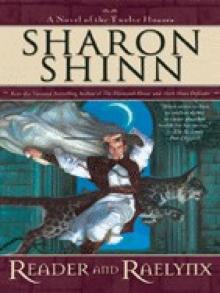 Reader and Raelynx
Reader and Raelynx Angel-Seeker
Angel-Seeker Archangel
Archangel Jeweled Fire
Jeweled Fire Nocturne
Nocturne The Shape-Changer's Wife
The Shape-Changer's Wife Still Life With Shape-Shifter
Still Life With Shape-Shifter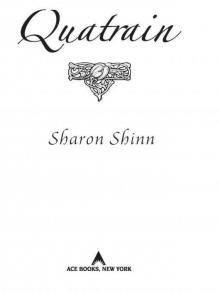 Quatrain
Quatrain Fortune and Fate
Fortune and Fate Angelica
Angelica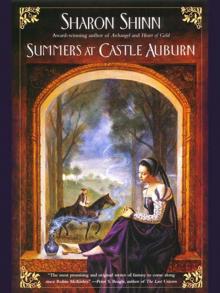 Summers at Castle Auburn
Summers at Castle Auburn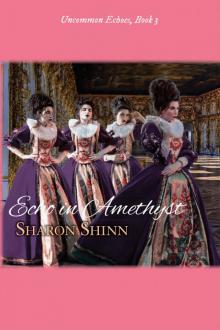 Echo in Amethyst
Echo in Amethyst The Turning Season
The Turning Season Mystic and Rider
Mystic and Rider Heart of Gold
Heart of Gold The Shape of Desire
The Shape of Desire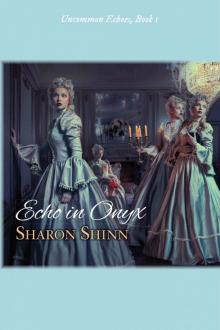 Echo in Onyx
Echo in Onyx Royal Airs
Royal Airs Gateway
Gateway The Safe-Keeper's Secret
The Safe-Keeper's Secret Wrapt in Crystal
Wrapt in Crystal Unquiet Land
Unquiet Land Jovah's Angel
Jovah's Angel Dark Moon Defender (Twelve Houses)
Dark Moon Defender (Twelve Houses) Mystic and Rider (Twelve Houses)
Mystic and Rider (Twelve Houses) Fortune and Fate (Twelve Houses)
Fortune and Fate (Twelve Houses)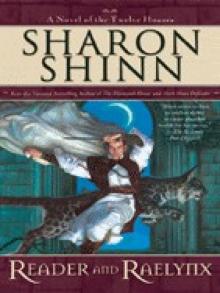 Reader and Raelynx (Twelve Houses)
Reader and Raelynx (Twelve Houses)